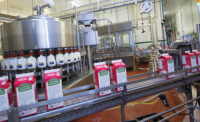Aurora Organic finds savings in cold storage, packaging, recycling

Aurora Organic Dairy has reduced its shuttling of products to and from cold storage by 90% by opening a new energy-efficient plant in Platteville, Colo., in 2014. The plant features heat exchangers, low-wattage lighting and more efficient HVAC, according to the company’s Corporate Citizenship Report for 2015.
AOD has reduced water use per half-gallon equivalent of milk by 18% from 2012 to 2014, and this year employees have instituted a process to incorporate pauses in water flow at the gallon jug rinse station, expected to save more than 500,000 gallons per year, the CCR report states.
“This is a good example of how the culture of sustainability, once absorbed, [spurs employees to] come up with their own ideas on how to tread lighter on the environment,” said Craig Edwards, manager of corporate sustainability and innovation for the Boulder-based company.
The company’s processing plant recycled more than half (54%) of waste it generated in 2014, totaling 787 tons, up from 430 tons in 2012. Half-gallon milk cartons that contain milk residue comprise the largest component of landfill waste — 2.5 million disposed of in 2014 — and AOD is working on a solution that would allow these cartons to be recycled. In doing so, the dairy expects to meet its overall goal of recycling 75% of plant waste by 2017.
“We are looking to address those [challenges] and find solutions wherever possible,” Edwards told Dairy Foods. “This is a work in progress. We’re not going to back off that goal of achieving a 75% diversion-from-landfill rate. We’ve got to recycle those [cartons] to be able to hit our goal.”
Cold storage warms up savings
- In the cold storage facility in Platteville, Colo., robots place and receive pallets 18 positions high. The energy used to move the cranes is partially offset by the energy captured, as the system uses gravity to lower pallets to the ground.
- A glycol system at the outbound loading area keeps the concrete slab free of snow and ice in the winter.
- Adding the cold storage facility saved the dairy 250,000 trucking miles and 500MT of CO2e emissions in 2014.
Looking for a reprint of this article?
From high-res PDFs to custom plaques, order your copy today!




